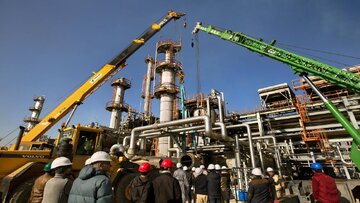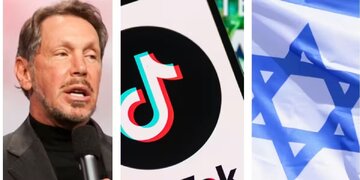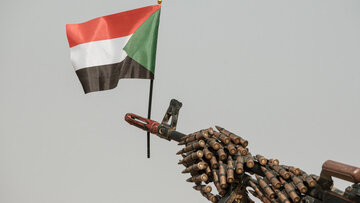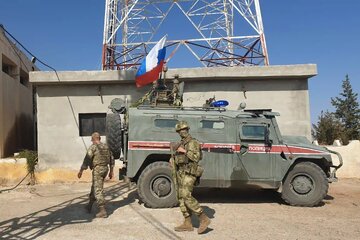Ahlulbayt News Agency: Syrian Interim President Abu Mohammad al-Jolani, officially named Ahmad al-Sharaa, in his fourth foreign trip visited the UAE along with his Foreign Minister Assad al-Sheybani.
Al-Jolani, who has recently named himself the president of the transition period without any election following a controversial new constitutional statement, is now prioritizing his foreign visits after making sure of stabilizing his position in power of new Syria in a bid to help settle major challenge his nascent regime is grappling with in addition to seeking regional and international recognition.
Al-Jolani, who has opened a special account on the wealthy Arab countries of the Persian Gulf, visited another important country of the (Persian) Gulf Cooperation Council after traveling to Saudi Arabia a few weeks ago, this time to try his luck in Abu Dhabi.
Upon arrival at Al Bateen Airport, he was received by Abdullah bin Zayed Al Nahyan, the UAE's FM, and then went to Al Shati Palace for talks with Mohammed bin Zayed Al Nahyan, the UAE's ruler, to show that the Emiratis also see this trip as a special opportunity to get closer to the new rulers of Damascus.
The Syrian presidential office announced in a statement that the meeting was held within the framework of bilateral relations and political dialogue between the two countries. No further details about the meeting were released. This is his first trip to the UAE after ousting Bashar al-Assad earlier in December last year. He had previously traveled to Jordan, Egypt, and Qatar.
Agenda of the visit
One of the main drivers behind his visits to the Arab countries, especially the UAE, is garnering political and financial support.
As mentioned, two months after formation of the government led by the Hayat Tahrir Al-Sham (HTS), the group has not yet gained international legitimacy and even recurrent rights violations and deadly crackdowns of opponents have deepened the distrust in the al-Jolani’s grandiose promises for post-Assad era.
Despite Arab support for the new Syrian regime, most Arab countries have so far refrained from entering the political equation in Syria, as the country continues to face increasing political and security instability that blocks the entry of foreign actors into the country. This trip took place in a situation where the French public prosecutor has filed a complaint against al-Jolani and a number of his cabinet ministers on charges of "genocide, ethnic cleansing" and crimes against humanity, during the bloody events known as the "Syrian coast Massacre" that resulted in the deaths of more than 1,700 people from the Alawite minority.
Therefore, given the effective role of the UAE in the region and the Arab world, al-Jolani intends to enhance the legitimacy of his shaky regime in the region with these diplomatic trips so that other Arabs will gradually move towards normalizing relations with new Damascus.
On the other hand, Syria is in dire straits economically due to the long war and Western sanctions and needs hundreds of billions of dollars for reconstruction, and for this reason, one of the expectations of the new Syrian government is that the Emirates and other Arab monarchies help the Syrians in this path.
Emirates is one of the richest countries in the region that can play an important role in a aiding Syria and helping it with reconstruction. Therefore, the interim president hopes that with the help of Abu Dhabi, he can solve some of Syria's financial problems and strengthen his position at the top of the power pyramid.
Since the reconstruction is undeniably tied to the Western sanctions, al-Jolani tries to use the UAE influence in the US and persuade the Westerners to lift the sanctions. Since as long as sanctions are on the Syrian neck like sword of Damocles, any opening in economy and progress in reconstruction are unthinkable.
In addition, the HTS is one of the groups that was previously blacklisted as a terrorist group and does not have a good image among Arab countries. Therefore, the trip to the UAE and meeting with high-ranking officials could be an attempt to improve the image of this group in regional and international public opinion. This group intends to present itself as a reliable political and military force that is committed to the peace and stability of its neighbors, especially in the issue of concerns about the increase in terrorism, and as a government that will be committed to bilateral, regional and international obligations.
Since the UAE and Saudi Arabia have hostile approach and policy towards Muslim Brotherhood-aligned groups, especially the HTS, al-Jolani is trying to show that this group does not have extremist or Brotherhood tendencies, so that he can perhaps win the approval of the rulers of Abu Dhabi. Al-Jolani will also guarantee that he can confront the Syrian resistance groups that have recently posed challenges to the new regime, and that the UAE and the Arabs should not worry about this.
Another issue that al-Jolani likely pursued in his UAE visit is the issue of confronting the Israeli occupation policies in Syrian territory.
Having in mind that the UAE normalized its relations with the Israeli regime since 2020 and has good relations with the Israelis, al-Jolani wants to use Abu Dhabi to convince Tel Aviv to stop the attacks in Syria. He is seeking to persuade the Israeli regime to implement the 1974 agreement and is counting on the UAE rulers to achieve this goal.
In May 1974, the UN Security Council resolution 350 declared a ceasefire between Israel and Syria and the peacekeeping mission has since been deployed to the occupied Golan Heights of Syria. But after fall of al-Assad, Israeli Prime Minister Benjamin Netanyahu scrapped the agreement, saying Tel Aviv is no longer committed to it. He then ordered large-scale incursions into Syrian territory, seizing other regions in addition to full Golan Heights. This is a source of worries to al-Jolani and the HTS leaders.
What does UAE want from Damascus?
There is no doubt that Abu Dhabi has interests behind meetings with new Damascus leaders. The UAE may use groups like HTS to counter Turkey’s growing influence in Syria. Therefore, the meeting with al-Jolani could be part of its efforts to adjust and set the balance of power in Syria. The UAE and other Arab countries are concerned about Turkey’s extensive influence in Syria under the HTS rule and want to strengthen their foothold in Syria by drawing al-Jolani to their side.
The UAE also wants to ensure, especially in terms of security, that an HTS-ruled Syria poses no threat to neighboring countries. On the other hand, if peace and security return to the country, the UAE also has an eye on investing in Syrian infrastructure to for economic advantages.
Dim outlook of al-Jolani’s diplomacy
Though al-Jolani with his regional visits is seeking legitimacy and position boost, experience of the past months has shown that these visits do not do much to settle Syria's problems.
So far, the Arab countries and the international community have not recognized the HTS, making it hard for Syria to return to the global equations, and perhaps it takes years for Damascus to see the door opened, a scenario the Taliban in Afghanistan is facing. Despite regional meetings, foreign legitimacy remains a dream for the Taliban leaders.
Concerning sanctions relief, there is currently no hope that al-Jolani will be able to overcome his problems. Although the US has apparently supported al-Jolani’s regime, in practice it has shown that it seeks to secure Israel's interests, and until the threats of HTS against Israel are not eliminated, Washington will not take any action to help the group. As some sources said last week, the US changed the status of the Syrian UN mission from "a delegation of a UN member state" to "a delegation of an unrecognized government in Syria," a move indicating that Washington has no intention for now to recognize new rulers of Damascus.
Additionally, the US continues to support Syrian Kurdish groups, and as long as the situation of the Kurds in Syria is not stabilized and the HTS does not grant them autonomy, it is unlikely that Washington will reconcile with the HTS. Therefore, al-Jolani’s diplomatic efforts to lift the sanctions will not lead anywhere in the short term.
The issue of reconstruction with Arab help is also still in limbo, and the Arabs are unwilling to take the plunge for now. Because foreign investors will not take action until Syria is stabilized and security is restored in this country.
There are also no clear prospects on the issue of the UAE’s mediation between Syria and Israel. Because Netanyahu's government has defined specific goals for itself, and the Emiratis cannot convince Tel Aviv to stop its attacks in Syria and withdraw from the occupied territories.
Since its foundation, Israel has pursued "Nile to Euphrates" expansionist project, and Syrian developments have granted it the best opportunity to realize part of its evil plan. So, outcomes of Al-Jolani’s visits will be limited to taking pictures with Arab leaders and it is a empty hope to expect legitimacy and financial aids from Arab states.
Despite the struggle to win foreign support and improve Syrian relations with the foreign world, without fundamental changes to the power structure in Syria and working out comprehensive solutions to the humanitarian crisis and reconstruction, al-Jolani’s visits to regional countries will not tangibly influence the critical Syrian situation.






Your Comment